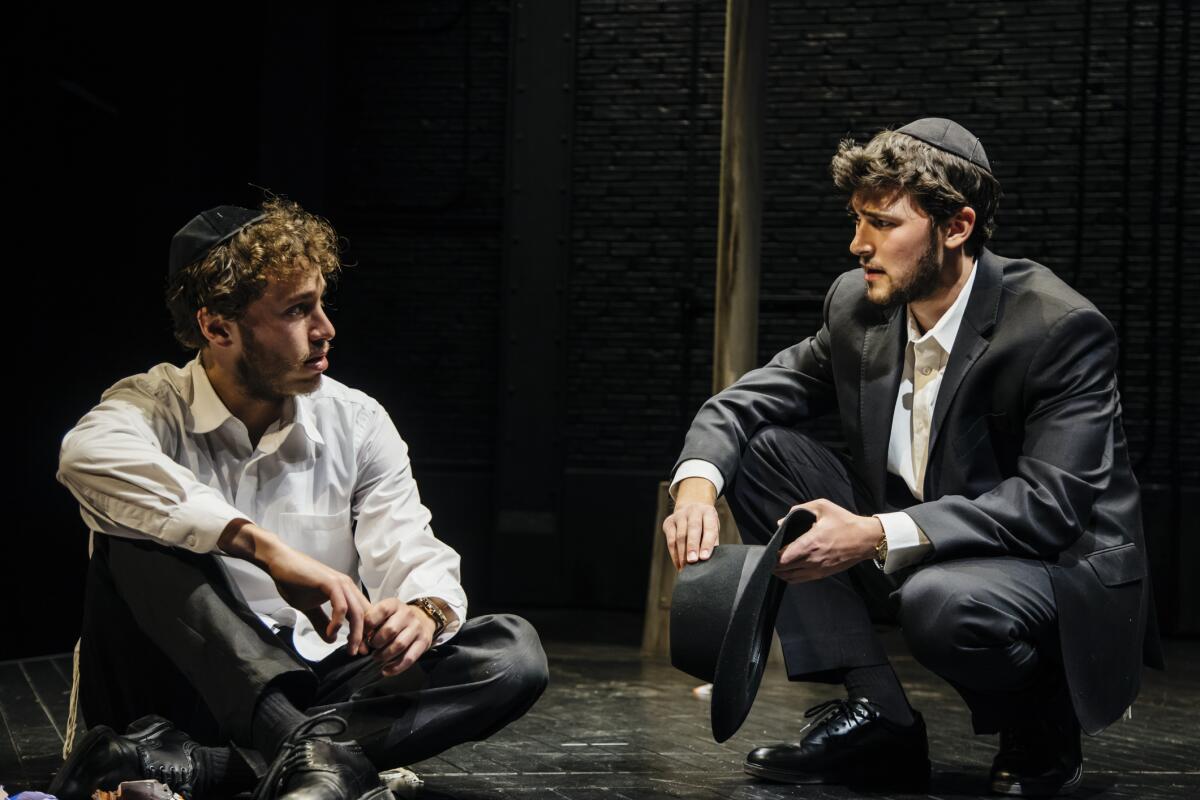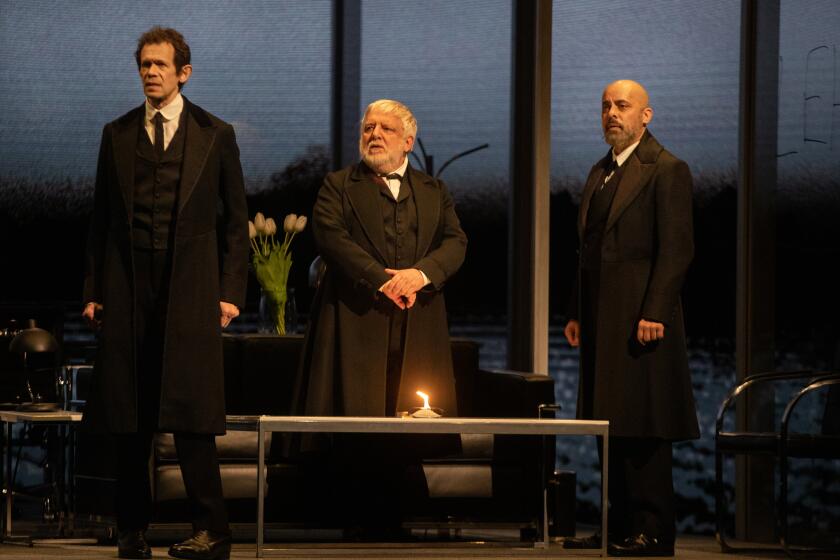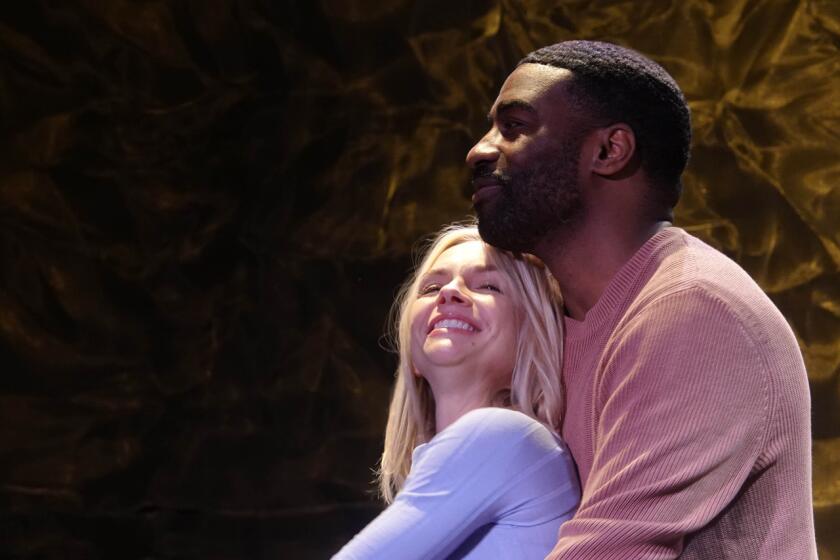Review: ‘Trayf,’ a sweet-natured buddy comedy in a mitzvah van, explores Jewish identity

- Share via
A car is an essential element of most buddy comedies. In “Trayf,” Lindsay Joelle’s entertaining bromance set in and around New York’s Orthodox Jewish community, the vehicle of choice is a mitzvah van.
The play, which opened March 10 at the Geffen Playhouse’s intimate Audrey Skirball Kenis Theater, constructs an unusual friendship triangle: Zalmy (Ilan Eskenazi) and Shmuel (Ben Hirschhorn), two 18-year-old Hasidic Jews from Brooklyn’s Crown Heights neighborhood, encounter a lost soul named Jonathan (Garrett Young) when driving around Manhattan in their “tank” on one of their missions to rescue Jews who have lost touch with their faith.
A clerk at a popular Lower Manhattan music store, Jonathan has recently learned that the father he’s still grieving was a Holocaust survivor. This information helps him connect some of the traumatic dots of his family, but he’s not sure how to embrace his newly discovered Jewish heritage.
Zalmy, ablaze with curiosity about life outside his religious community, takes Jonathan, who was raised Catholic, under his wing. He invites his broken and bereaved new friend home to Brooklyn for Shabbat dinner, welcoming him into a culture of rigorous tradition that is especially comforting to someone who hasn’t known his roots.
In exchange, Zalmy gets to ask Jonathan, who’s about 10 years older and infinitely more worldly, about sex in licentious Manhattan. He also taps into Jonathan’s knowledge of pop music, another taboo subject of endless fascination.
The year is 1991, so mixtapes — in the form of actual cassettes — play a vital role. Jonathan, who is grateful that someone is guiding his path to becoming an observant Jew, makes compilations that Zalmy smuggles into his room like precious contraband.
“The Lehman Trilogy,’ which dramatizes the rise and fall of a banking giant, arrives at the Ahmanson Theatre fresh from its heralded Broadway run.
Secular music is forbidden. Shmuel is shocked to learn that Zalmy, his best friend since childhood, even knows the name Elton John, never mind any of the artist’s songs. “When you hear music, the soul of another is in the room,” he says. “So I don’t want a goyishe songwriter should be entering my soul and trayfing up the place!”
“Trayf,” which describes food prohibited by kosher law, is grammatically redeployed to underscore the dangers of assimilation. Shmuel lives in such a bubble that he has only a child’s understanding of the workings of sexual intercourse. The prospect of romantic love pales in intensity to the platonic affection he feels for his mitzvah tank “first mate.” He reminds Zalmy of religious proscriptions out of fear of losing the person dearest to him in all the world.
The dynamics of this trio are observed by Joelle with a lively wit and genial wisdom. As Jonathan becomes more fanatical in his quest to be accepted as a convert, Zalmy grows more preoccupied with the profane pleasures of roller disco and musical theater. Shmuel, seething with suspicion, secretly follows Zalmy on one of his fugitive outings. He’s horrified to learn that his friend not only attended a Broadway performance of “Fiddler on the Roof” but removed his yarmulke after the show.
Although fraught with jealousy, these male relationships are suffused with a delicate tenderness. A boyish innocence underlies “Trayf.” Eskenazi’s Zalmy has a welcoming smile that puts one in mind of Miranda exclaiming at the end of Shakespeare’s “The Tempest,” “O brave new world that has such people in’t!” When Hirschhorn’s Shmuel looks at Zalmy, his eyes exude a love that defies category.
Young’s Jonathan is harder to place. A slacker in demeanor, he turns out to be extremely punctilious in matters of faith. The zeal of the convert skids into fanaticism, but there’s something touching about the character’s flailing search for deeper meaning.
Spread the word: Buzzy playwright Daf James’ “On the Other Hand, We’re Happy” gets a stellar U.S. premiere at L.A.’s Matrix Theatre.
The production, directed by Maggie Burrows on a spare and simple set by Tim Mackabee, recognizes that the strength of the play lies in the emotional attachments of these young men. The geography of the staging, sketched by a bench and a couple of chairs, can be hard to track. It’s not always clear if a moment is taking place inside the mitzvah van, on a patio or on a street corner. But the actors vibrantly map out the inner terrain of their characters.
Joelle is more effective in setting up the dramatic conflict than in resolving it. “Trayf” stalls at the hour mark. A fourth character is introduced, Leah (Louisa Jacobson), Jonathan’s estranged girlfriend, who brings a more progressive Jewish perspective to the story. Jacobson makes the most of her one scene, but the playwright discards Leah and her challenging questions about religious and cultural identity.
Earlier in the play, Shmuel takes up the issue of what makes a person a Jew. His answer, “a Jewish soul,” is tautological. Leah, in her brief appearance, dismantles this mentality. But Joelle, skirting the larger philosophical conundrums raised by her characters, settles for a comic ending in which difficult matters are dismissed with a heartwarming image.
It’s fun eavesdropping on these dudes in their mitzvah tank. But after whetting my appetite, “Trayf” left me hungering for more substantive spiritual nourishment.
'Trayf'
Where: Audrey Skirball Kenis Theater at the Geffen Playhouse, 10886 Le Conte Ave., L.A.
When: 8 p.m. Tuesdays-Fridays, 3 and 8 p.m. Saturdays, 2 and 7 p.m. Sundays. Ends April 10
Tickets: $39-$129 (subject to change)
Contact: (310) 208-2028 or geffenplayhouse.org
Running time: 1 hour, 20 minutes (no intermission)
More to Read
The biggest entertainment stories
Get our big stories about Hollywood, film, television, music, arts, culture and more right in your inbox as soon as they publish.
You may occasionally receive promotional content from the Los Angeles Times.













